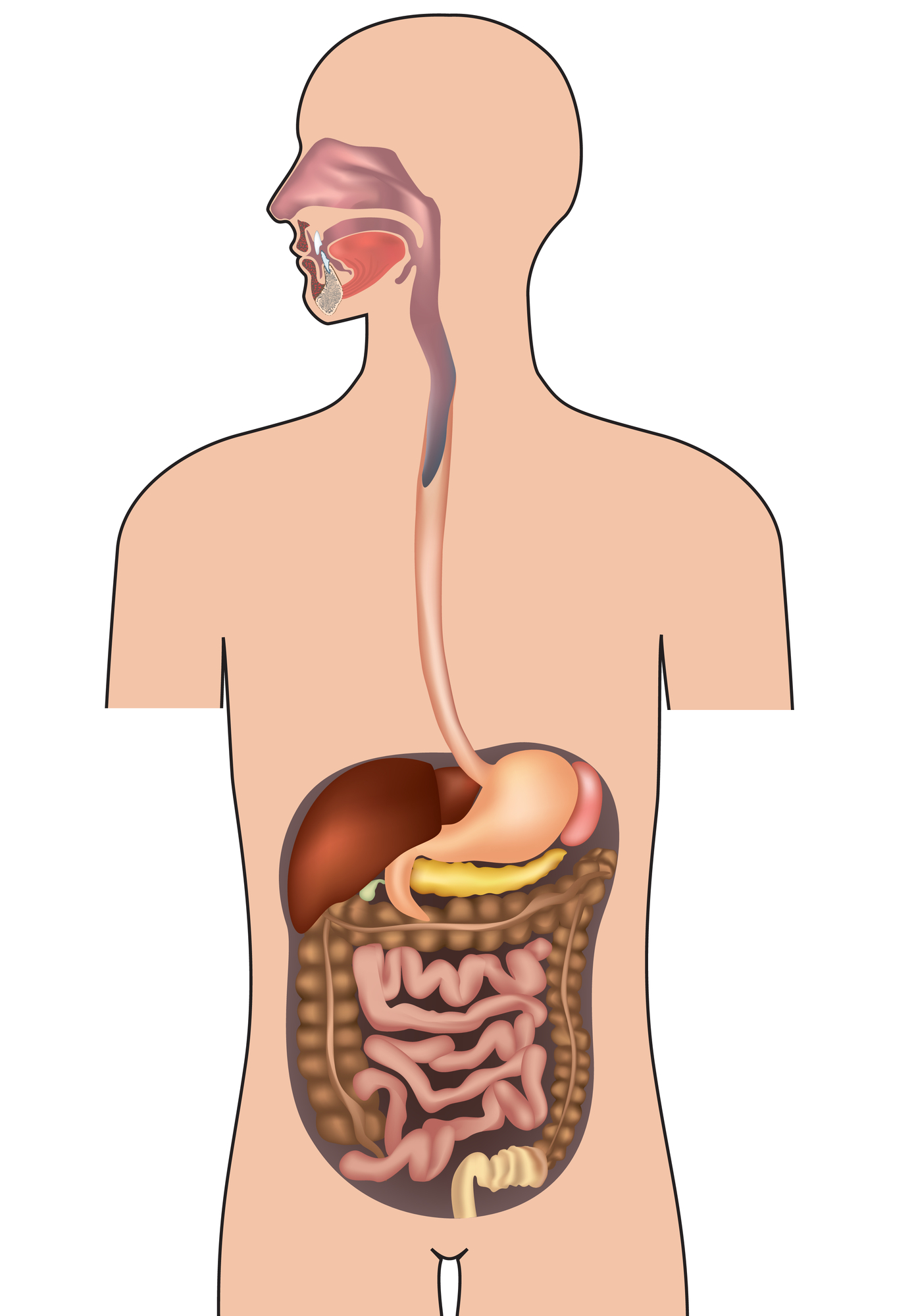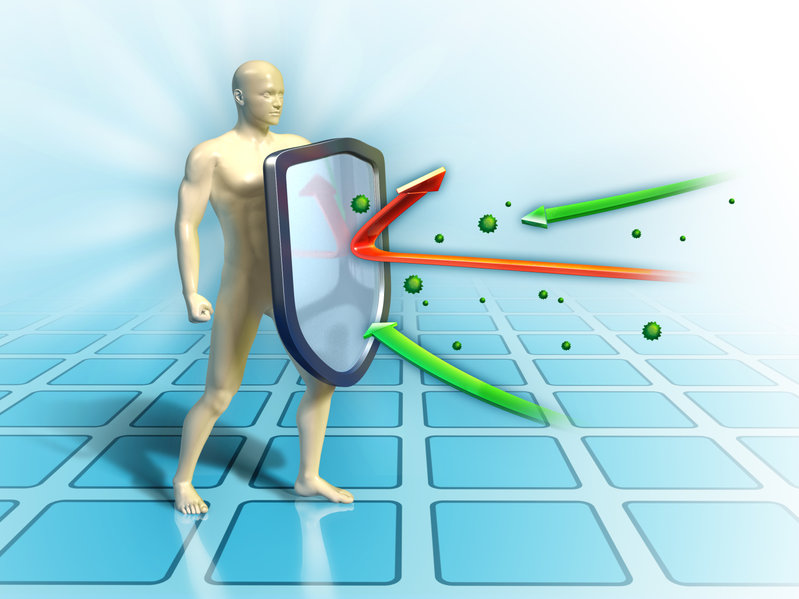Water and the Immune System - Harms and Benefits
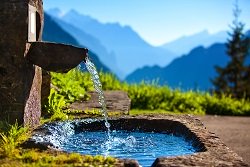
Water is not only two hydrogen atoms with one atom of oxygen that makes an H2O water molecule. Water in real life contains more than these two different atoms that we studied from the periodic table in school. Water has living organisms or microbes, all types of minerals, and natural organic matter like micro vegetations. Like many things in life, water and the immune system have an intricate relationship such just like how food can impact our immunity condition.
Humans for thousands of years have been drinking water from natural or wild water sources such as underground water coming from deep aquifers that eventually move upward towards the surface which is called now spring water. So let me briefly talk about the types of drinking water sources we have at our disposal and how water can affect the immune function positively or negatively.
Types of Drinking Water
Tap Water: Where it is sourced?
The untreated drinking water comes from a man-made reservoir, lakes, rivers, streams, wells, or even underground water such as aquifers.
Here is a brief process of cleaning the water to be drinkable. One of the first steps to treat raw water is by using coagulant chemicals (ex., aluminum sulfate) that cause particles in the water to stick or cluster together to get rid of them. Then one of the next treatments is using filtration process where the water goes through activated carbon (this usually to eliminate unpleasant taste and odor), sand, and gravel. Next, using chlorine and ozone treatments to sterilize pathogenic microbes as the last stage or almost. Many of the counties or cities in the United States add fluoride claiming its benefit to prevent tooth decay!
How Tap Water Affects the Immune System
City water or municipal water is treated with a necessary evil that is Chlorine chemical to clean your tap water, but it is also harmful for human consumption since it kills the bad and good microbes in your body with no discrimination, similar to the effects of antibiotics.
That’s not all, disinfecting with chlorine causes toxic byproducts such as halo acetic acids and trihalomethanes (1). You see, chlorine interacts with organic matter in water causing it to create what is known to scientists for many years DBPs or Disinfection Byproducts.
The Other Problem
The other problem with treating water is the limited ability of water treatment plants (or, at least, most of them) of getting rid of other substances. Things like pharmaceutical drugs that millions of people ingest and then eliminate (via urination) as much as 90% and this enormous quantity end up in toilets and then as part of wastewater.
The sewage treatment plant will filter many unwanted substances but until this day, there is no technology or mechanism of filtration to filter out all types of pharmaceutical drugs such as antibiotics and anticancer drugs to name a few.
Whatever water that has been treated will be funneled to surface waters that many cities use that same surface water to be treated for tap water which again can not filter or get rid off of prescribed or over-the-counter drugs. Many industrial chemicals will find their way to surface water or underground water such as lubricant oils, detergents, and all types of pesticides from agricultural areas.
What does that mean?
Surface waters can be, for example, a lake, river, or reservoir, and fish and other organisms will be consuming some of these compounds in their system, and we will get them when we eat these fish. Even you choose not to eat fish from certain water bodies these water sources will be used as I mentioned previously to be treated with tap water.
So can you imagine with me what tap water can do negatively to your immune system whether directly or indirectly?
Distilled Water
The distillation process works by boiling water so the water vapor is then collected and condensed and this process leaves out minerals, metals, microbes, and other contaminants. The distillation process is useful to a certain point and here is why:
-Possibility of volatile toxic chemicals such as benzene that has a lower boiling point can evaporate and mix with the steam. I am not sure what other unwelcome chemicals have the same or lower boiling points that will mix with the water stream!
-The other issue with distilled water is devoid of beneficial minerals that your body can utilize thus making it an acidic medium.
-However, distilled water is considered to be a good way to detoxify the body since it can actively absorb minerals(toxic and non-toxic) from the body. So, I feel it can be a good idea to use distilled water temporarily to detoxify but not for a long time since distilled water can strip off the minerals from your body.
Reverse Osmosis Water
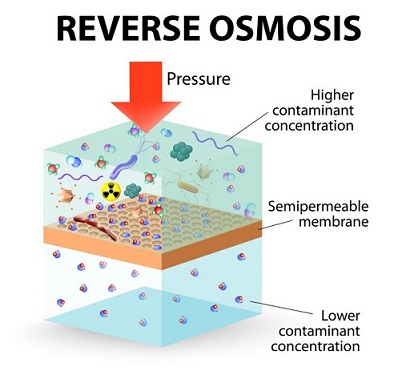
In reverse osmosis(RO) the tap water passes through different stages of purification, example of steps are:
-filter to remove sediments like dirt and silt
-Activated carbon filter to get rid of organic compounds, chlorine, and to enhance the taste and smell.
-A semipermeable membrane that allows the water to pass through leaving behind contaminants such as microbes (ex., viruses and bacteria), fluoride, chlorine, arsenic, lead, mercury, and volatile organic compounds (VOCs).
It is not a cheap purification system to install in your house and at the same time, the water pressure in the house needs to be between 60-70 PSI to be effective in pushing or thrusting tap water through the semipermeable membrane.
The RO is very effective in cleaning your tap water and is so effective the water becomes too clean that is unhealthy. It cleans everything even the precious minerals in water that your body needs. There are RO systems where they add another filter stage to re-mineralize the water and make it more suitable for drinking.
Bottled Water
Bottled water comes from different sources, such as distillation, reverse osmosis, well or spring water. When water is sourced from underground it will be treated with one or more of the following methods:
1-Ion-exchange: this method is usually used for “hard water” that contains a high concentration of two particular minerals which are magnesium and calcium.
2-Ozonation: ozone is O3, which means three atoms of oxygen instead of two atoms. The ozone layer in the atmosphere is a protective layer against some of the wavelengths of the sun’s radiation. Ozonation disinfects water by destroying microorganisms.
Bottled water also comes from distillation and reverse osmosis processes which I dislike since they taste like industrial-grade water, too clean for me. Water in a plastic bottle will leach some of the chemicals from the plastic material with many of these chemicals have an estrogenic effect on the body not to mention it is an expensive habit to drink bottled water in the long term.
Well Water and Spring Water
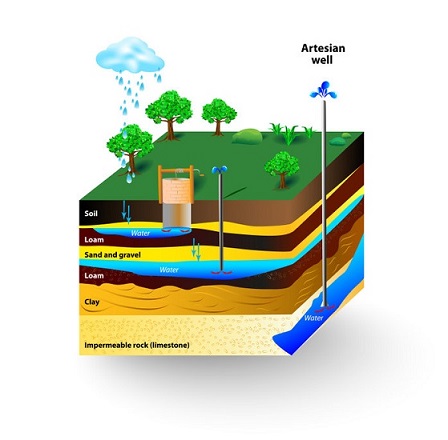
Springwater is different from good water in the following sense. Water coming from rain and other surface water that travels or percolates into the ground takes tens, hundreds, and even thousands of years.
This water goes through a natural purification process from many layers underground until it reaches a porous bedrock called an aquifer. Then this wonderful water travels up back to the surface going through another filtration process. Let’s take a look through this mother nature process of filtration where rainwater filters through:
1-topsoil where the rhizosphere that consists of plant roots, soil, and microorganisms clean the water.
2-Then water penetrates through 40 to 60 feet of sand
3- Next it goes through carbon deposits before hitting the bedrock or aquifer.
4-Then this water goes up back to the surface
This whole journey of filtration takes from hundreds to thousands of years so I don’t think whatever filters they have in the market would match this pure and biocompatible water. Most water springs are not contaminated since it has been filtered through many layers of earth, and the water is being in dark and cool temperature place.
The main difference between well and spring water is that well you need to dig or drill down hundreds of feet to reach this water but spring water gets to the surface with its complete hydrologic cycle so think of spring water as a ripe banana ready to be consumed however well water is not.
In my opinion, there is, nothing better than spring water to benefit the immune system and health overall.
Here is a website www.findaspring.com that will help you to find spring water hopefully closer to where you live and at the same time there is a chat room that you can ask other individuals who have been there and consumed spring water from the location you intend to get from.
Final Words about Water and Immune System
There is no doubt in my mind drinking tap water full of
- Chlorine
- Fluoride
- Pharmaceutical drugs (ex., antibiotics, birth control pills, etc.)
- Disinfection Byproducts such as haloacetic acids and trihalomethanes
It Will negatively affect your microbiota (gut flora) and that will lead to an imbalance of immune function.
Sources


